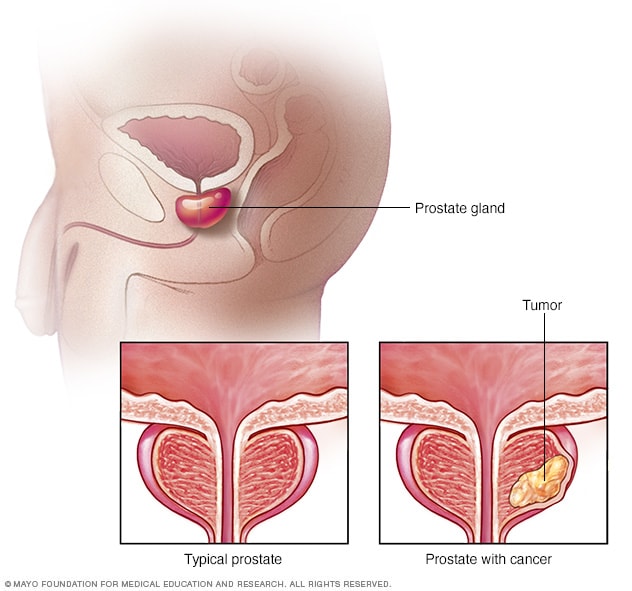概述
前列腺癌

前列腺癌
前列腺癌是一种起源于前列腺的细胞生长物。前列腺是帮助生成精液的小腺体,是男性生殖系统的一部分。此图展示了典型前列腺与患癌前列腺。
前列腺癌激素治疗是一种降低或阻断睾酮的治疗方法。这种疗法也被称为雄激素剥夺治疗(ADT)。
大多数前列腺癌细胞需要睾酮才能生长。ADT 抑制睾酮的分泌或使其无法到达前列腺癌细胞。这会导致前列腺癌细胞死亡或生长减缓。
前列腺癌激素治疗可能需要使用药物,在极少数情况下,可能通过手术切除睾丸。
类型
前列腺癌激素治疗的类型包括:
- 通过药物阻止人体分泌睾酮。 一些药物会阻断指示睾丸产生睾酮的信号。这些药物称为促黄体素释放激素(LHRH)激动剂和拮抗剂,另一个名称是促性腺激素释放激素(GnRH)激动剂和拮抗剂。
- 阻断体内睾酮作用的药物。 这些药物称为抗雄激素类药。它们通常与 LHRH 激动剂联合使用。这是因为 LHRH 激动剂在睾酮水平降低之前可能导致睾酮水平暂时升高。
- 切除睾丸的手术。 这项手术称为睾丸切除术。它可以快速降低体内睾酮水平。在某些情况下,仅切除产生睾酮的睾丸部分。这两项手术都是永久性的。
前列腺癌激素治疗(ADT)以药物形式进行,可以持续给药,也可以间歇性给药:
- 持续性 ADT 是指不间断给药。
- 间歇性 ADT 是指持续给药一段时间,或直到前列腺特异性抗原(PSA)检测结果显示数值较低。该检测可测定前列腺癌性组织和非癌性组织产生的一种蛋白质。如果数值较低,则暂停治疗。如果癌症复发或恶化,则可重新开始治疗。
一些早期研究表明,间歇性 ADT 的副作用可能更少,并且对某些患者来说仍然与持续性 ADT 一样有效。该治疗也可能帮助患者逐渐改善状态。
目的
前列腺癌激素治疗可用于阻断体内的睾酮激素。睾酮可促进前列腺癌细胞的生长。
激素治疗可以缩小癌症病灶并减缓其生长。但激素治疗本身并不能治愈前列腺癌。
激素治疗通常是晚期前列腺癌的首选治疗方法。该治疗通常不单独用于治疗早期前列腺癌。激素治疗可以与其他治疗方法联合使用。这些治疗方法可能包括放射疗法、用极冷液体冷冻癌细胞(称为冷冻疗法)或称为 PARP 抑制剂的靶向治疗。PARP 抑制剂是多腺苷二磷酸核糖聚合酶抑制剂的另一个术语。
在前列腺癌治疗的不同阶段以及出于不同原因,激素治疗都可能是一个选择。例如:
- 针对已扩散至其他身体部位的前列腺癌(转移性前列腺癌),以缩小癌症病灶并减缓肿瘤的生长。该治疗还可能缓解症状。
- 针对已扩散至邻近组织的前列腺癌,可以增强放射疗法的效果,从而降低癌症复发的风险。
- 前列腺癌治疗后,在前列腺特异性抗原(PSA)检测水平仍然很高或开始升高的情况下。
- 降低癌症复发高危患者的癌症复发风险。
风险
前列腺癌激素治疗的副作用可能包括:
- 肌肉流失、骨质变薄(骨质疏松)和骨折。
- 体脂增加和体重增长。
- 性欲减退,无法勃起或维持勃起(勃起功能障碍)。
- 潮热。
- 体毛减少、生殖器变小、乳房组织发育。
- 疲倦。
- 情绪变化,例如焦虑和抑郁,可能包括情感淡漠。
- 糖尿病和心脏病。
如何进行准备
请与肿瘤科医生讨论您的选择
在开始治疗之前,您将与一位专门诊断和治疗癌症的医生(肿瘤科医生)会面。如果您正在考虑接受前列腺癌激素治疗,请与肿瘤科医生讨论您的选择。为这次会面做准备,列出需要咨询的问题。
关于为什么推荐激素治疗的问题:
- 有哪些可选的治疗方案?
- 我需要接受激素治疗吗? 如果需要,您建议我接受激素治疗的原因是什么?
- 激素治疗对我的具体情况可能有哪些益处?
- 您提供哪些类型的激素治疗?您建议采用哪一种?
- 激素治疗对我的疗效可能持续多久? 如果激素治疗失效,我有哪些选择?
- 还有其他治疗方案需要考虑吗?
关于风险的问题:
- 激素治疗可能存在哪些风险和副作用? 哪些是最常见的?
- 激素治疗会如何影响我的日常生活,包括我的作息、活动、性健康、精力水平和情绪?
- 我可以通过哪些生活方式调整或药物治疗来降低风险和副作用?
- 治疗期间,您将如何检查和处理副作用?
关于治疗预期的问题:
- 激素治疗是如何进行的——是服用药物、注射、植入还是手术?
- 您将如何检查治疗效果? 我需要做哪些检查?
- 激素治疗需要持续多长时间?
- 治疗期间,我需要遵循饮食或运动计划吗?
- 在激素治疗期间,我需要在工作或居家方面做出任何改变吗?
- 我可以在哪里找到互助组或咨询服务来帮助我应对治疗期间的情绪问题?
可能出现的情况
GnRH 和 LHRH 激动剂和拮抗剂
这些药物可抑制睾丸分泌睾酮。
大多数此类药物以针剂(也称为注射剂)的形式给药。注射剂会进入皮下或肌肉。根据所用药物的不同,注射剂的注射频率可能是每月一次、两三个月一次或几个月一次。
其中一些药物可能作为植入剂植入皮下。这种植入剂会逐渐缓慢释放药物。
GnRH 和 LHRH 激动剂包括:
- 亮丙瑞林(Eligard、Lupron Depot 等)。
- 戈舍瑞林(Zoladex)。
- 曲普瑞林(Triptodur、Trelstar)。
GnRH 和 LHRH 拮抗剂包括:
- 地加瑞克(Firmagon)。
- 瑞卢戈利(Orgovyx)。
在接受 LHRH 激动剂后的几周内,睾酮水平可能会短暂升高。这称为激增。GnRH 和 LHRH 拮抗剂不会导致睾酮水平激增。
睾酮水平激增可能使癌症症状恶化。对于具有睾酮激增高风险且会影响症状的患者,早期使用 GnRH 拮抗剂或抗雄激素类药可以降低风险。
抗雄激素类药
抗雄激素类药可阻断体内睾酮作用。新型抗雄激素类药有时被称为雄激素受体通路抑制剂(ARPI)或雄激素受体信号抑制剂(ARSI)。抗雄激素类药可以片剂形式服用。
可选药物包括:
- 阿帕他胺(Erleada)。
- 达罗他胺(Nubeqa)。
- 恩扎卢胺(Xtandi)。
- 阿比特龙(Yonsa、Zytiga),常与泼尼松联用。
睾丸切除术
极少进行这种切除睾丸的手术。在对腹股沟部位实施麻醉后,外科医生会在腹股沟做一个切口并经此切口取出一侧睾丸,然后对另一侧睾丸重复此过程。在某些情况下,仅切除产生睾酮的睾丸部分。
所有手术都有疼痛、出血和感染的风险。大多数患者在做完此手术后即可回家。此手术通常不需要住院。
结果
如果您接受激素治疗(也称为雄激素剥夺治疗 [ADT])来治疗前列腺癌,则需要定期就医。您可能会被问及可能出现的任何副作用。您可以使用药物治疗某些副作用。如果您出现肌肉流失、骨质疏松、体重增长或感到疲劳,运动也会有所帮助。
激素治疗耐药性
随着时间的推移,大多数前列腺癌最终会对 ADT 产生耐药性。这意味着激素治疗会失效。即使睾酮水平非常低,癌症仍会继续生长。您可能听说过这种类型的癌症被称为去势抵抗性、激素抵抗性或雄激素抵抗性。您也可能听说过激素难治性前列腺癌(HRPC)这一名称。
很难预测前列腺癌多久后才会对 ADT 产生耐药性。接受 ADT 治疗的患者中,约有一半人会在 2 至 3 年内产生耐药性。大约一半人会在 2 至 3 年后才产生耐药性。
医疗护理专业人员可能会安排您接受定期检查,以了解您的健康状况,并观察癌症是否复发或恶化。这些检查可以显示您对 ADT 的反应。
如果您的癌症似乎出现了耐药性,您通常需要继续接受激素治疗。这是为了保持较低的睾酮水平。如果睾酮水平升高,可能会导致癌症生长或恶化。
医疗护理专业人员可能会建议您采用不同的激素治疗。根据您的具体情况,您也可能需要使用其他类型的药物。其他药物可能包括:
- 化疗。
- 一种含有放射性物质的药物,称为放射性药物。
- 一种被称为多腺苷二磷酸核糖聚合酶(PARP)抑制剂的药物。如果您存在某些基因变异,这可能是一种选择。
- 一种针对免疫系统的药物,称为免疫疗法。如果您患有某种类型的肿瘤,这可能是一种选择。
生存率。
前列腺癌患者在开始激素治疗后能存活多久因人而异。这取决于癌症的分期和扩散程度等因素。医疗护理专业人员可能会根据您的状况提供更准确的信息。